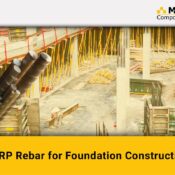Eco-Friendly Bridges with GFRP Rebar: A Sustainable Solution
The construction industry is rapidly shifting toward sustainable, eco-friendly, and durable materials. For decades, metal rebars have been the primary reinforcement in bridge construction. However, they come with challenges such as corrosion and high maintenance costs. Glass Fiber Reinforced Polymer (GFRP) Rebar is an innovative alternative construction material that enhances the durability and sustainability of bridges while reducing environmental impact.
In this article, we will explore how GFRP rebar for bridge construction is revolutionizing infrastructure by offering a lightweight, corrosion-resistant, and eco-friendly alternative to traditional reinforcement materials.
Why Choose GFRP Rebar For Eco-Friendly Bridge Construction?
Bridges are the backbone of transportation networks, connecting cities, fostering trade, and enhancing economic development. However, traditional bridge construction heavily relies on materials like metal rebars. Metal rebars are not prone to rust and corrosion, which can damage Bridges. Therefore, bridge construction requires regular maintenance and replacement.
By integrating GFRP bars, engineers and contractors can construct eco-friendly bridges that are not only stronger and more Durable but also significantly reduce environmental impact. GFRP rebars eliminate corrosion issues, lower maintenance costs, and enhance the structural integrity of bridges over time. Additionally, the transportation of GFRP Rebars is also easy because of their lightweight property.
Advantages of GFRP Rebar in Bridge Construction
1. Corrosion Resistance
Unlike traditional metal rebars, GFRP bars are highly corrosion-resistant and ideal for bridges exposed to water, salt water, chemicals, and harsh weather conditions. This durability ensures bridges remain structurally sound for decades without the risk of rust or material degradation.
2. Lightweight Yet High Strength
GFRP rebar is ¼ lighter than metal rebars, reducing transportation costs and simplifying installation. GFRP Rebars are also stronger, providing more strength to bridge construction.
3. Lower Carbon Footprint
The production process of GFRP rebar generates fewer greenhouse gas emissions than traditional metal rebars, making it a more sustainable choice for infrastructure development. By using GFRP bars, engineers contribute to environmentally responsible bridge construction.
4. Enhanced Longevity & Cost Savings
Glass Fiber Reinforced Polymer (GFRP) Rebar is a durable bridge construction material. It provides lower maintenance costs, as there is no need for frequent repairs or replacements, leading to substantial cost savings over time.
5. Non-Magnetic & Non-Conductive
GFRP rebars do not conduct electricity or interfere with electromagnetic fields, making them an excellent choice for railway bridges, power grid infrastructure, and high-tech applications where magnetic interference could be a concern.
6. Superior Seismic Performance
Due to their flexible nature, GFRP bars can absorb seismic shocks more effectively than rigid metal rebars. This makes them ideal for bridges in earthquake-prone regions, improving overall structural safety and resilience.
Applications of GFRP Rebar in Bridge Construction
- Highway Bridges: Used for decks, beams, and barriers to prevent corrosion-related failures.
- Pedestrian Bridges: Ensures safety, durability, and minimal maintenance requirements.
- Railway Bridges: The non-conductive nature of GFRP rebars makes them ideal for railway bridges where electromagnetic interference must be minimized.
- Coastal & Marine Bridges: High corrosion resistance makes them perfect for bridges exposed to saltwater environments.
- Temporary & Emergency Bridges: Lightweight GFRP bars enable faster construction, which is crucial in emergencies.
Future of GFRP Rebar in Sustainable Bridge Construction
The demand for eco-friendly construction materials is growing, and GFRP rebar manufacturers in India and worldwide are continuously innovating to enhance the properties of glass fiber-reinforced polymer bars. Research also focuses on recycling methods for GFRP rebars, ensuring a closed-loop material cycle for future sustainability.
Conclusion: A Smart Choice for Modern Bridges
Adopting GFRP rebars in bridge construction is a step toward a more sustainable, cost-effective, and durable infrastructure. With benefits such as corrosion resistance, lightweight properties, and environmental sustainability, GFRP bars are the future of modern bridge engineering.
MRG Composites
MRG Composites is the leading GFRP rebar manufacturer in India, offering high-quality and durable solutions for construction projects. As The Pioneers of GFRP rebars in India, MRG Composites sets the benchmark for innovation and reliability. With the best GFRP rebar prices in India, we ensure quality and reliability. Contact us for expert consultation and superior reinforcement solutions. GFRP Rebar is an ideal choice for all construction.
FAQs
Yes, GFRP rebar has a higher tensile strength than steel rebar while being significantly lighter. This makes it an excellent choice for bridge construction, providing durability and ease of installation.
GFRP rebar reduces the carbon footprint of construction by lowering greenhouse gas emissions during production. Its durability and resistance to corrosion also minimize the need for replacements, making it an eco-friendly choice for bridge construction.
All Categories
Recent Posts
GFRP Rebar vs. Steel Rebar: Strength, Durability & Benefits
GFRP Rebar for Foundation Construction
MON-SAT 8:00-9:00
+91 69 863 6420




